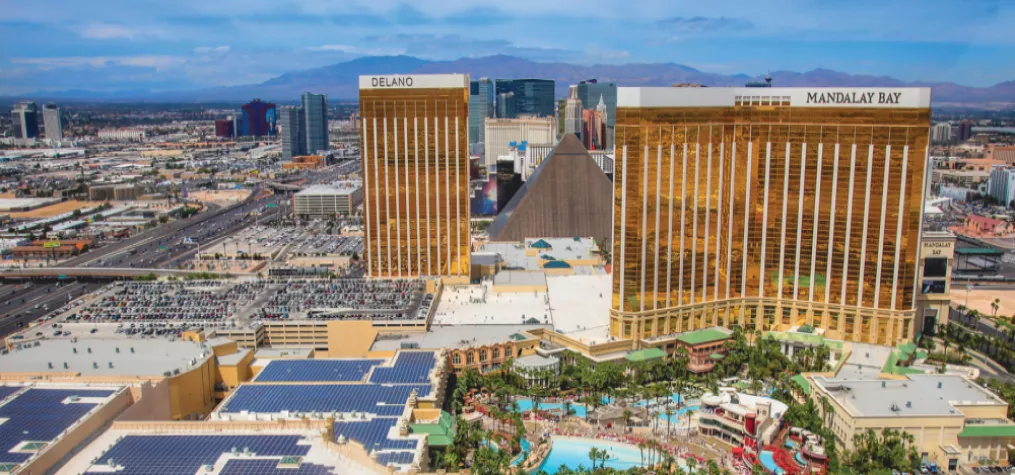Green Strides: Suzanne Morrell, Founder, Creating Environments and Sustainability Consultant

When it comes to achieving true sustainability, the meetings and events industry has a lot of work to do. For decades, many planners have been touting the “green” practices they’ve been carrying out at events such as going paperless, recycling, reducing waste and reusing signage, all with good intentions. But when faced with the hard, cold fact that the industry by its very nature creates temporary experiences in an extremely wasteful way, producing massive amounts of carbon emissions in the process, are those low-hanging-fruit-type practices really enough? The answer is obvious.
It’s time for a reality check, according to award-winning, Washington, D.C-based event producer Suzanne Morrell, founder of STM Enterprises|Creating Environments, who has been designing experiential events globally and online for more than three decades. A sustainability consultant and mentor in the Climate Reality Leadership Corps, as well as a member of the board of directors and leadership team of the Sustainable Event Alliance, Morrell advises event teams on sustainable design, food and beverage safety, sustainable venue and site selection, virtual event production, staff training, waste management and sustainable materials and suppliers.
Corporate Event News had a chance to catch up with Morrell to get her thoughts about the industry’s current progress in moving toward a net zero waste and carbon future, and how forward-thinking event planners can stop going along with the status quo and through more progressive efforts, collectively push the industry from sustainability 1.0 to 2.0 as soon as possible.
How did you become interested in event sustainability, and how has your career path led you to where you are now?
I think everyone who is involved with sustainability in events at one time or another has an “aha” moment that steered them into a path to produce events in a more sustainable and responsible manner. My aha moment was when I noticed a complete breakdown in conflicting job functions at a conference I was planning—planners moving guests back into the plenary from a coffee break in between sessions, while banquet staff was still replenishing the buffets. Shortly after the session began and the doors were closed, the banquet staff dismantled their display of pastries and freshly poured glasses of juice, and all of it went in the trash or down the drain.
I come from a citrus growing family. I know what it takes to get that glass of orange juice. Orange juice doesn’t just happen. You have to grow the trees, harvest, pack, squeeze, process and ship. All these steps take resources. And when you dump it down the drain, you’ve wasted all those resources along the supply chain—not just one glass of juice.
So, from that moment on at that conference, I became committed to doing everything and anything to eliminate food waste from my events. That meant educating myself on food loss and waste, learning about food insecurity, learning about climate change and how the event industry is a contributor to these things. Most importantly, I try to figure out how we can change our processes to have a positive, not negative, impact.
At this time, where is the trade show and meetings industry when it comes to sustainability?
To be honest, I took an unforced sabbatical this year due to a traumatic brain hemorrhage, so I haven’t seen first-hand what’s been going on lately. But now that I’m on the road to recovery, I do feel that we haven’t moved the needle much at all. I see a lot more awareness and talk but not a lot of action.
As an industry, we need to make systematic changes that are easy to adopt and hopefully be encouraged by clients to buy in. We need more “cool kids” setting the tone, for example, like in the music industry, with musicians making sustainability part of their brand. From there, I think it will be easier to adopt across the industry.
We also have to do better with knowledge-sharing, data analysis and reporting. We say we want a sustainable event or trade show, but many can’t get beyond the three [recycling] bins. Taking that next step seems daunting.
The UNFCC Race to Zero Criteria is the only giant step forward I’ve seen in 2022. It maps out a path forward to net zero and includes an interpretation guide to help decipher all the new terms. This is a great starting point for all of us to jump in.
What grade would you give our industry at this time?
From where I saw things this year in both live and virtual events, I’d give it a C—and that’s being generous.
When it comes to the carbon emissions produced by in-person events, travel is by far the biggest emitter. How can our industry resolve this challenging obstacle in achieving meaningful sustainability?
Until we are able to have event holograms, we will need to travel, so let’s make the travel count. Leave the location better than when you arrived. Think how your event can help the community. What can be donated? What trash can you eliminate to not clog the local landfills? Buy local. Can you establish a community garden? The ideas and opportunities are only limited by your imagination and creativity.
After so many years of talking about the importance of moving toward a zero-carbon, zero-waste future, do you believe the industry has made much progress, and quickly enough? If not, what’s it going to take to accomplish this?
No, and no. The average planner, large or small, is still working off the same checklist from 30 years ago. Even with virtual events, we are stuck and often moving backwards as events get larger and more complex using multiple supply streams. We are overly focused on how it looks and one-upping—thank you, social media!
There are two camps: those who want to do things the way they’ve always been done, and a small but mighty group who wants to disrupt the industry. You have a choice: continue on the path and have the same dusty dinosaur of an event that you’ve been planning for a million years or look forward.
Carbon emission Scopes 1, 2 and 3—that’s a new language that needs to be learned. But there are event professionals out there who can help. Add a sustainable event professional into your staffing plan to work alongside you in the planning process. You have options to help your event make a positive impact on the planet and community!
Don’t miss any event-related news: Sign up for our weekly e-newsletter HERE, listen to our latest podcast HERE and engage with us on Twitter, Facebook, LinkedIn and Instagram!


Add new comment